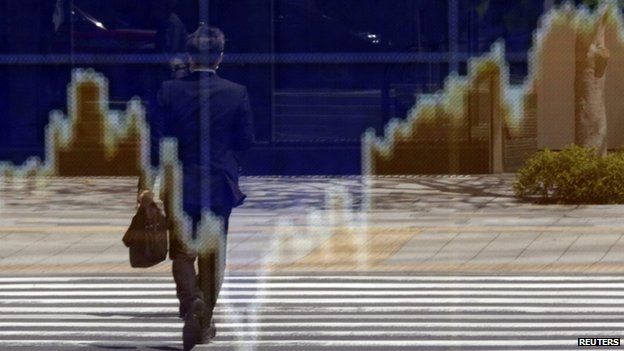-
14 July 2015
- From the section Business
- comments

After fines totalling many billions of pounds from UK and US regulators, a new threat is about to hit the major banks found guilty of manipulating the foreign exchange market.
US lawyers are preparing multi-million-pound legal action – to be lodged in the autumn – against up to 12 banks.
The targets include HSBC, the Royal Bank of Scotland, Barclays and US banks JP Morgan and Citigroup.
The action will be led by the US law firm Scott and Scott.
It will be of particular concern for the banks and their investors.
‘Conspiracy’
Why? Because many of the banks named have already paid out hundreds of millions of pounds in compensation payments following similar legal moves by Scott and Scott in the US.
Managing partner David Scott told the BBC he is confident of a similar outcome here.
He is in London before travelling to Paris and Berlin to meet complainants that are likely to include multi-national businesses, pension funds and even, he says, central banks.
“It is very safe to say that the damages suffered by the clients are in the tens of billions of dollars,” he told me.
“We’ve been over [here] meeting with central banks, pension schemes, large multinationals who have asked us to determine if they have been harmed as a result of the conspiracy.
“We have met with central banks and they have expressed an interest – they are interested in the institutional knowledge that we have gained litigating the forex case in the United States.
“We have developed a model that allows us to give a pretty good idea of what their damages are if they traded foreign currency.”
Sorry story
I asked him directly if he had spoken to the Bank of England, a question he sidestepped, saying that he wasn’t able to give details of specific clients.
The legal cases are just the latest chapter in the sorry story of foreign exchange manipulation.
Last November, six banks were fined £2.6bn by UK regulators after after traders were found to be manipulating the foreign exchange market.
Groups of traders from different banks with exotic names such as “the Three Musketeers” and “the A team” deliberately massaged rates at which they bought and sold currencies to major businesses so that the banks would make higher profits, and the traders higher bonuses.
This UK fines were followed by action by US regulators, which fined banks £3.6bn in May.
‘Paper cuts’
The European Commission is now investigating whether competition laws were also breached by the banks’ behaviour.
“The manipulation caused people who traded foreign currency to pay more than they would have in a free market,” Mr Scott said.
“The people who are ultimately the victims of the conspiracy do not know it, because you cannot have a good conspiracy unless it is well concealed.
“And because the [foreign exchange] market is so large, the banks and traders did not need to bludgeon somebody over their head to steal their money.
“They just needed to make small paper cuts and bleed people very slowly – because each of those cuts in a market this large ultimately leads to a very large pot of money. The customers had no idea they were being defrauded.”
‘Sophisticated’
Mr Scott denies that he is in the UK “ambulance chasing” – signing up clients in the hunt for lucrative fees.
“This is not an ambulance-chasing venture,” he said.
“The clients that we are representing are large sophisticated multinational corporations, pension schemes and central banks who have been victimised.
“I don’t think they would consider us ambulance chasers, they are more likely to see us as white knights.”



